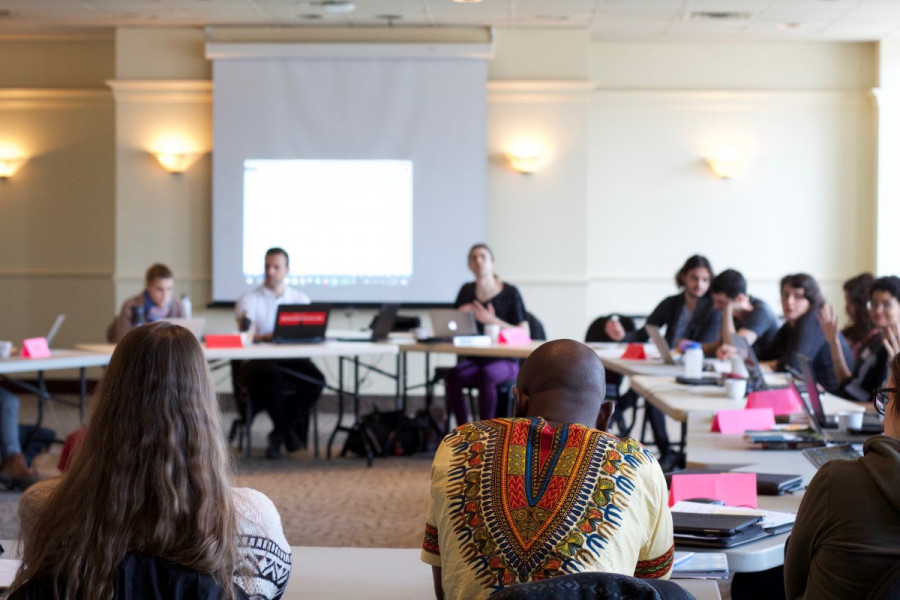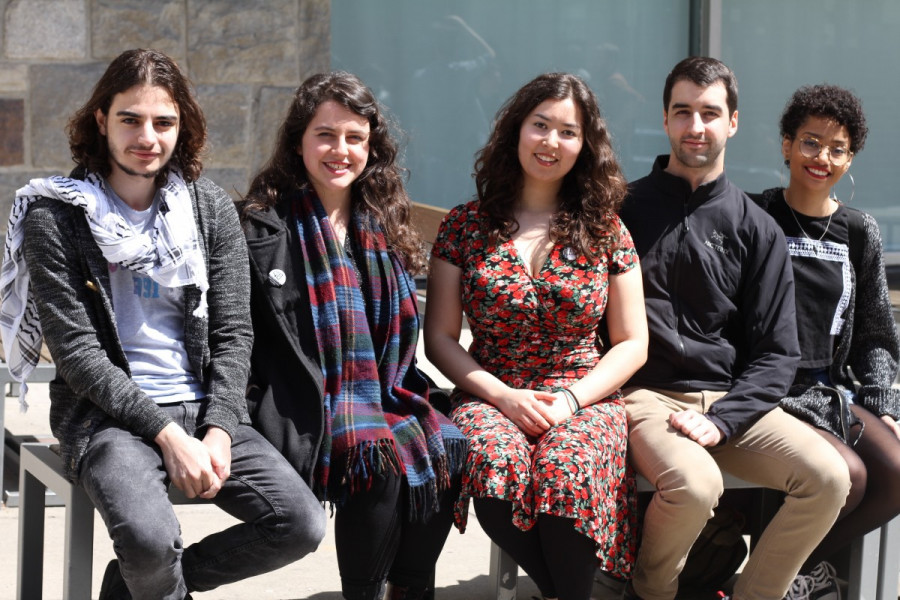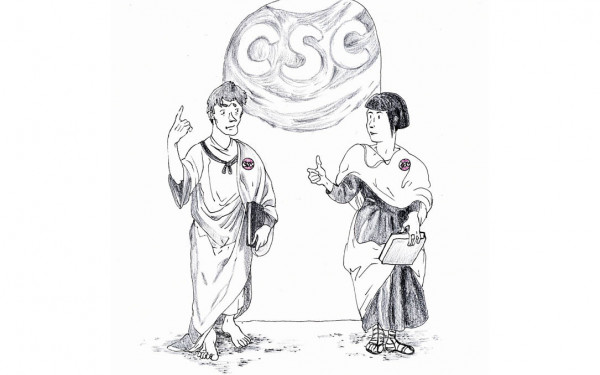AVEQ Moving Up in Size
Election Results and Highlights From Their Weekend Congress
The Association for the Voice of Education in Quebec had their elections last Friday, and after a year of only having two to three executives at a time, they now have a full slate of six. Those elected will start working in May.
AVEQ is a student association that operates on the provincial level. It represents the student associations that choose to join it, and seeks to gain a broader understanding of the needs of Quebec students through collaboration and research.
Right now, AVEQ’s member associations are the Concordia Student Union, Mouvements d’associations générales étudiantes de l’Université du Québec à Chicoutimi, and L’Association générale étudiante de l’Université du Québec à Rimouski, who were all present at the congress.
Others also present at the weekend-long congress from April 21 to 23 included L’Association Générale des Étudiantes de l’Université du Québec à Trois-Rivières, Fédération étudiante de l’Université de Sherbrooke, and the Student Society of McGill University.
The election was done in closed session, and voting rights were extended to all student associations around the table, including non-member associations.
General Coordinator Christopher Gyorffy explained that the voting process was done this way because AVEQ aims to represent student associations, rather than represent students individually.
“In terms of logistics, it would be very hard for us have ballot boxes in Chicoutimi, Rimouski and Concordia,” he continued.
Mobilization coordinator Kirsten Perry also explained this method of voting ensures more equality between the student associations at the table, since regional student associations have significantly less members than those in Montreal, for example.
General Coordinator
_900_651_90.jpg)
Gyorffy was re-elected as general coordinator, a role he’d held since their January by-elections. He is an undergraduate student at Concordia’s School of Community and Public Affairs.
As general coordinator, he’ll oversee their campaigns, and lobby for the interests of their member associations and policy change by opening up communication between AVEQ and MPs from Quebec’s National Assembly.
“Our philosophy is that while we are willing to talk with the government, we acknowledge that it’s not always the best way to have student interests heard,” he said. “So we recognize the need for mobilization and direct action.”
Over the next year, he says AVEQ will mobilize against pipelines in the province, and will campaign against the recently announced provincial budget. AVEQ is unhappy with the amount that has been allocated to education, saying it’s not enough in light of the cuts that were made in previous years.
Mobilizing against the budget is key for them, Gyorffy said, because one of their goals is to fight for free education, and against austerity measures which they say have disproportionately affected regional universities. He admitted that this won’t be easy.
Over the past year, Gyorffy has focused on convincing student associations in Quebec to join AVEQ. On April 18, MAGE-UQAC from Chicoutimi voted through referendum to join AVEQ. McGill’s undergraduate student association is also hoping to join AVEQ, and plans to put it to referendum next fall. Concordia’s Graduate Student Association asked their students to vote on joining AVEQ during their elections from April 11 to 12, but it failed.
To be a part of AVEQ, member associations have to put the question to referendum with the students in their association or have it voted in through a general assembly. If passed, students would pay an additional fee levy of $3.50 each semester to fund AVEQ.
Mobilization and Associative Development Coordinator
Kirsten Perry has a Bachelors degree in environmental science from McGill. She’s been AVEQ’s mobilization and associative development coordinator throughout the past year, and will continue in the position for the next year.
Her job consists of leading and organizing AVEQ’s campaigns, which are decided based on the needs of their member associations. For the 2017-2018 academic year, she’ll put a focus on the two campaigns that the student groups voted to focus on at their congress: accessible education and climate justice. That’ll mean campaigning for free education and more funding for education, better pay for internships, and mobilizing against the construction of pipelines in Quebec.
Over the year she worked to convince the minister of higher education Hélène David to organize five different consultations on sexual violence. They were used to plan what sorts of methods can be used by universities to better prevent and respond to sexual violence, and took place in Chicoutimi, Sherbrooke, Quebec City, Gatineau and in Montreal.
“We really noted that there was good will on the part of the ministry, and a lot of people participated in making a lot of progress on this issue,” said Perry. “At the same time some of the voices that we wanted to have heard more we’re not heard as much, despite AVEQ and other student associations really pushing for including survivors and making sure their voices were at the forefront.”
“We really noted that there was good will on the part of the ministry, and a lot of people participated in making a lot of progress on this issue,” said Perry. “At the same time some of the voices that we wanted to have heard more we’re not heard as much, despite AVEQ and other student associations really pushing for including survivors and making sure their voices were at the forefront.”
For next year, she says she’ll work to make sure that AVEQ has its own policy on sexual violence.
Recently, AVEQ allocated close to $40,000 to support various initiatives on campuses around Quebec. Perry was not able to make public the exact groups that will get funding, but said most applications for funding came from groups at Concordia, UQTR in Trois-Rivières, and UCAR in Rimouski. Perry explained that this was for confidentiality purposes.
Over the year, she hopes to organize another mobilization camp, where training and workshops will be open to student associations from around Quebec. AVEQ had their last one in October, and which lasted for three days.
She’ll also start working more with the Unité de travail pour l’implantation de logement étudiant, a non-profit real estate developer in Montreal that focuses on affordable student housing. This comes after the congress voted for AVEQ to become a member of UTILE. Becoming a member would allow AVEQ to vote at their general assemblies.
Research and Education Coordinator
Sophia Sahrane has worked for the past year as the CSU’s Academic and Advocacy Coordinator. For next year she’ll oversee all the research that AVEQ takes part in, and plans to continue their research into the quality of health insurance for international students. Some research has also been done on the impact of provincial austerity measures on universities in the regions, and is expected to furthered next year as well.
Sahrane could not be reached in time for comment.
Sociopolitical Affairs Coordinator
Haxan Bondu decided to run for AVEQ’s executive team after working with the Yes committee at UQAC for joining AVEQ. She’s currently studying high school education with a focus on history and geography in Chicoutimi.
In the past she’s worked with her faculty association, and was a part of a mobilization committee that formed in response to the 2012 student strike at her CEGEP.
She hopes to keep up communication between regional universities and those in Montreal, and said this congress was a good start.
“Right now we have this idea that communication between say, McGill, and a regional university like UQAC would be unheard of. It’s the reality.” Bondu said. “There’s an impression that were totally disconnected from each other. If we can have an association like AVEQ who can destroy that stereotype, then we can start having better communication.”
Graduate Studies Coordinator
Clement D’Allaire Maltais is completing a Masters degree at UQAC in Chicoutimi, and has worked within his faculty associations and their committees in the past. He decided to run after attending AVEQ’s last congress in Chicoutimi from January 14 to 15.
The main issue among graduate students is isolation, D’Allaire Maltais said, as many graduate students tend to be disconnected from the student movements happening around them.
He plans to also work with workers unions that graduate students are in, so that he can help advocate for fairer working conditions for internships and other forms of student employment.
Secretary General
Rami Yahia was elected as AVEQ’s secretary general. His job will consist of writing policy, structuring agendas for meetings, and organizing the time and place of their congresses.
Over the year he was part of the CSU as their internal affairs coordinator, and before that was general coordinator of the Concordia group Solidarity For Palestinian Human Rights. He’s still in the process of finishing his undergraduate degree in Engineering and Computer Science.
“I want to help AVEQ shape more progressive values and directions,” he said.
Other Highlights from the Congress

After this weekend, only AVEQ’s member associations will be able to vote at their congresses. Now observers will only be able to put forward motions and engage in discussion. That means that only MAGE-UQAC, CSU and AGECAR will be able to vote at their next congress in Trois-Rivières from July 7 to 9.
It was also decided that AVEQ will hire more full-time staff. They’ll work up to 60 hours per week to work in research, political analysis, and/or communications and graphic design. They’ll be hired sometime before their next congress. Right now, AVEQ only has one staff member who works full time.
AVEQ also announced they will soon be moving to their own office space. Over the past year, they’ve been using space inside of the CSU’s offices, but with a full executive team of six, that will no longer be feasible. Their new offices will be located on 400 Atlantic Ave, just off of Parc Avenue in the Mile End, and rent will cost $2,000 per month.
With files from Jon Milton.




_600_375_90_s_c1.jpg)
_600_375_90_s_c1.jpg)
_600_375_90_s_c1.jpg)
